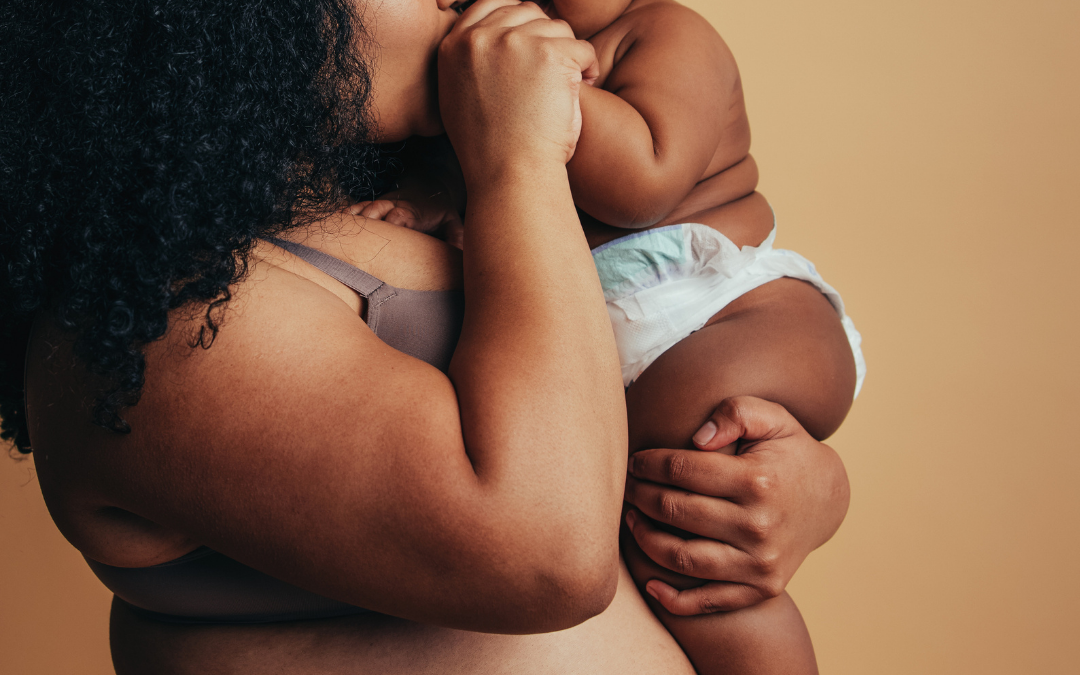The average woman in the US is a size 16-18, according to a study released in 2016. That means that if you’re consider yourself plus-sized or fat and giving birth, you’re perfectly normal. Plus-size pregnancy is common.
It’s likely though that at some point in your pregnancy, you will be made to feel like your weight is a problem.
Maybe from your doctor or midwife, maybe from friends and family. It’s possible that the critical voice will be your own.
As doulas, we have seen birthing folks of all sizes have healthy pregnancies, beautiful births and healthy babies.
Our goal is to today is to dispel some of the myths around pregnancy in a larger body, and address any actual causes for concern.
According to the Centers for Disease Control and Prevention (CDC), women with a body mass index (BMI) of 25.0 to 29.9 are considered to be overweight, and those with a BMI of 30.0 or above have obesity.
Obesity is classified as a disease. This allows medical providers to treat it, and has likely given some people options if their weight is impacting their health. Unfortunately, it also leads to assumptions that obesity always results in poor health, and that any symptoms someone is experiencing can be treated by losing weight.
Let’s start with how your healthcare provider may see your pregnancy, since prenatal appointments can be some of the most challenging experiences for plus-size pregnant women.
Myth– Losing weight is the only way to conceive and carry a healthy baby to term.
Truth
Weight can be associated with with challenges in fertility, including miscarriage and stillbirth. But it’s critical to address the actual causes of infertility with a professional, rather than only focusing on weight.
Myth– Losing weight prior to pregnancy is the only thing you can do to change lower the risk of gestational diabetes and pre-eclampsia.
Truth- While having a higher BMI is associated with an increased risk of gestational diabetes and pre-eclampsia, you can practice behaviors that reduce your risks regardless of your size.
And practicing these healthy habits can improve your baby’s health, reducing your risks for preterm birth or a higher birth weight for your baby.
These healthy behaviors include:
- Moving your body regularly
- Eating nutritious meals in a way that balances your blood sugar and does not raise your blood pressure
- Reducing or managing stress
- Being aware of warning signs
- Getting consistent prenatal care
Myth– Being overweight means that you will have to give birth via cesarean.
Truth- Your size does not determine if a vaginal birth is right for you. When you and your baby are healthy, you can still plan to give birth vaginally, in a variety of positions.
With all of these myths, and the reality that medical professionals make many assumptions based on size, it’s no wonder that women who are overweight during pregnancy may experience some emotional ups and downs.
Pregnancy is a time of transition in how most everyone relates to themselves, and their bodies.
This is absolutely the case for plus-size pregnancies, since we live in a society that fat-shames regardless of what stage of life you’re in. You may notice that:
- Your baby bump shows later than in smaller women.
- You feel anxious about your baby’s health or your own
- People around you make insensitive comments about your weight and pregnancy
- You feel pressure to lose the baby weight quickly- sometimes even before the baby is here!
There is good news is though:
Your ability to have a happy healthy plus-size pregnancy in birth is not dependent on your weight.
And it’s not dependent on your doctor, your family or anyone else.
Regardless of how unpredictable pregnancy can feel, you have a lot of power in this scenario.
Here are some things you can do to improve your pregnancy:
1. Look for a medical provider- whether an obstetrician or midwife that treats you with respect throughout your pregnancy. This provider may practice a Health at Every Size approach to care, which is based on the idea that regardless of your weight or size, you deserve good health, and to be treated respectfully. This approach affirms that your size does not determine good health.
2. Use resources like Plus Size Birth.
Inform yourself about your options, learn how to obtain respectful care, and connect with other women/expectant parents.
3. Eat in a nutritious way that’s satisfying, keeps your blood sugar even and doesn’t raise your blood pressure with excess salt. Different ways of eating work for different people, but some general guidelines include:
- Taking your prenatals
- Eating lean protein
- Getting lots of whole foods rather than processed foods
4. Move your body, for both your mental and emotional well-being. While you want to follow your doctor’s guidelines, light exercise is safe during most pregnancies. Something like walking or prenatal yoga are classics, getting some blood flowing and releasing endorphins is good for your mood.
5. Surround yourself with with people who encourage you to enjoy pregnancy, and find joy in it yourself.
- Ban other people from sharing their own birth worries, fears or trauma with you
- Buy or rent maternity clothes in your size, that feel good
- Remember that your body is doing something remarkable- you’re making a human!
- Make sure that your birth team (partner, doula, providers, whomever) knows your concerns and trusts you and your body.
You absolutely can have a health pregnancy, regardless of your size. If you need someone in your corner during your plus-size pregnancy, the doulas at DC Metro Maternity are right here cheering you on.


